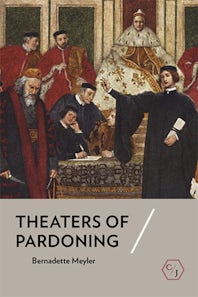Bernadette Meyler, Stanford University has published Theaters of Pardoning with Cornell University Press. From the publisher:
"Theaters of Pardoning brilliantly demonstrates the close link between sovereignty and pardoning in English law. Bernadette Meyler's deep knowledge, combined with her breathtaking breadth and depth, has resulted in a truly remarkable project." - Julia R. Lupton
"I read this book with real interest and genuine excitement about its interventions in the field of Shakespeare studies and the larger fields of law, literature, and political philosophy. Theaters of Pardoning is elegant, persuasive, and impressive." -Henry S. Turner
"At a time of international obsession with the power to pardon, Bernadette Meyler's Theaters of Pardoning could not be more timely or trenchant. Meyler deftly traces the genealogy of pardons through the various "theaters" in which they were performed—from the dramatic, to the legal, to the social—in seventeenth-century England. She argues that the tension internal to the traditional pardon, which excused individuals from the power of the state precisely by amplifying the sovereign's absolute power, ill suits such pardons for a liberal democracy committed to the rule of law. Meyler then reconstructs the pardon power by looking at possibilities elaborated in literature, though not yet in law—contending for a move from pardons bestowed by sovereigns to forgiveness granted by citizens to each other. As I watched the argument unfold, I was hard pressed to think of another scholar today with such a muscular command of political, legal, and literary theory. " -Kenji Yoshino
Further information is available here.
Praise for the book:From Gerald Ford's preemptive pardon of Richard Nixon and Donald Trump's claims that as president he could pardon himself to the posthumous royal pardon of Alan Turing, the power of the pardon has a powerful hold on the political and cultural imagination. In Theaters of Pardoning, Bernadette Meyler traces the roots of contemporary understandings of pardoning to tragicomic "theaters of pardoning" in the drama and politics of seventeenth-century England. Shifts in how pardoning was represented on the stage and discussed in political tracts and in Parliament reflected the transition from a more monarchical and judgment-focused form of the concept to an increasingly parliamentary and legislative vision of sovereignty.Meyler shows that on the English stage, individual pardons of revenge subtly transformed into more sweeping pardons of revolution, from Shakespeare's Measure for Measure, where a series of final pardons interrupts what might otherwise have been a cycle of revenge, to later works like John Ford's The Laws of Candy and Philip Massinger's The Bondman, in which the exercise of mercy prevents the overturn of the state itself. In the political arena, the pardon as a right of kingship evolved into a legal concept, culminating in the idea of a general amnesty, the "Act of Oblivion," for actions taken during the English Civil War. Reconceiving pardoning as law-giving effectively displaced sovereignty from king to legislature, a shift that continues to attract suspicion about the exercise of pardoning. Only by breaking the connection between pardoning and sovereignty that was cemented in seventeenth-century England, Meyler concludes, can we reinvigorate the pardon as a democratic practice.
"Theaters of Pardoning brilliantly demonstrates the close link between sovereignty and pardoning in English law. Bernadette Meyler's deep knowledge, combined with her breathtaking breadth and depth, has resulted in a truly remarkable project." - Julia R. Lupton
"I read this book with real interest and genuine excitement about its interventions in the field of Shakespeare studies and the larger fields of law, literature, and political philosophy. Theaters of Pardoning is elegant, persuasive, and impressive." -Henry S. Turner
"At a time of international obsession with the power to pardon, Bernadette Meyler's Theaters of Pardoning could not be more timely or trenchant. Meyler deftly traces the genealogy of pardons through the various "theaters" in which they were performed—from the dramatic, to the legal, to the social—in seventeenth-century England. She argues that the tension internal to the traditional pardon, which excused individuals from the power of the state precisely by amplifying the sovereign's absolute power, ill suits such pardons for a liberal democracy committed to the rule of law. Meyler then reconstructs the pardon power by looking at possibilities elaborated in literature, though not yet in law—contending for a move from pardons bestowed by sovereigns to forgiveness granted by citizens to each other. As I watched the argument unfold, I was hard pressed to think of another scholar today with such a muscular command of political, legal, and literary theory. " -Kenji Yoshino
Further information is available here.
